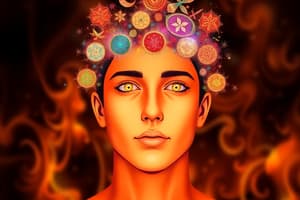Podcast
Questions and Answers
What does Socrates believe is essential for achieving happiness?
What does Socrates believe is essential for achieving happiness?
- Wealth and power
- Rhetorical skill and debate
- Self-knowledge and virtue (correct)
- Social acceptance and conformity
According to Freud, what are the three parts of the psyche?
According to Freud, what are the three parts of the psyche?
- Conscious, unconscious, subconscious
- Thoughts, emotions, behaviors
- Id, ego, superego (correct)
- Body, mind, spirit
Which perspective emphasizes the cognitive aspects of the self, such as intellectual activity?
Which perspective emphasizes the cognitive aspects of the self, such as intellectual activity?
- Philosophy
- Anthropology
- Sociology
- Psychology (correct)
What did Plato believe is the most divine aspect of the self?
What did Plato believe is the most divine aspect of the self?
Which part of the soul, according to Plato, is primarily concerned with sensual desires?
Which part of the soul, according to Plato, is primarily concerned with sensual desires?
What is the core idea behind the Socratic Method?
What is the core idea behind the Socratic Method?
Which philosopher argued that the soul is the essence of living things and inseparable from the body?
Which philosopher argued that the soul is the essence of living things and inseparable from the body?
What crucial idea did René Descartes introduce concerning the self?
What crucial idea did René Descartes introduce concerning the self?
Which layer of the self is NOT one of Freud's three layers?
Which layer of the self is NOT one of Freud's three layers?
What role does self-perception play in a person's adaptability according to the understanding of self?
What role does self-perception play in a person's adaptability according to the understanding of self?
Which aspect of personal identity did John Locke emphasize?
Which aspect of personal identity did John Locke emphasize?
Which medieval philosopher integrated Christian theology with Platonic thought?
Which medieval philosopher integrated Christian theology with Platonic thought?
What concept is central to both Socrates' and Plato's philosophy regarding the self?
What concept is central to both Socrates' and Plato's philosophy regarding the self?
What did Immanuel Kant distinguish between regarding the self?
What did Immanuel Kant distinguish between regarding the self?
St. Thomas Aquinas's philosophy suggests that the self is composed of which elements?
St. Thomas Aquinas's philosophy suggests that the self is composed of which elements?
According to Plato, which part of the soul seeks honor and victory?
According to Plato, which part of the soul seeks honor and victory?
What aspect of the psyche is primarily governed by immediate gratification according to Freud?
What aspect of the psyche is primarily governed by immediate gratification according to Freud?
Which part of the self is said to balance desires with societal norms in Freud's model?
Which part of the self is said to balance desires with societal norms in Freud's model?
From the sociological perspective, how is the self understood?
From the sociological perspective, how is the self understood?
How does the Eastern perspective view the self compared to the Western perspective?
How does the Eastern perspective view the self compared to the Western perspective?
What is the role of the superego according to Freud?
What is the role of the superego according to Freud?
Which of the following is NOT a component of Freud's three layers of self?
Which of the following is NOT a component of Freud's three layers of self?
According to Freudian theory, which element of the psyche strives for perfection and incorporates societal values?
According to Freudian theory, which element of the psyche strives for perfection and incorporates societal values?
What do pioneers agree on regarding the self from a psychological perspective?
What do pioneers agree on regarding the self from a psychological perspective?
Flashcards are hidden until you start studying
Study Notes
Understanding the Self
- "Self" includes awareness, self-esteem, self-knowledge, and self-perception, aiding social adaptation.
- Psychological aspects of the self are cognitive (thought processes) and affective (emotional responses).
Perspectives on Self
- Sociological perspective views self as shaped by social interactions.
- Anthropological perspective emphasizes culture's role in shaping the self.
- Psychological perspective sees self as unique to individual experiences, influencing behaviors based on physical and social environments.
Philosophical Perspectives on the Self
Socratic Ideas
- Socrates emphasized self-knowledge as essential for life improvement and happiness through virtue.
- Famous for the quote "The unexamined life is not worth living."
Platonic Concepts
- Plato regarded the soul as divine, capable of understanding Forms (ideas).
- Identified three parts of the soul: appetitive (sensual desires), rational (truth-seeking), and spirited (honor and victory).
Aristotelian Views
- Aristotle believed the soul is the essence of living beings, integrated with the body.
- Introduced three soul types: vegetative (growth), sentient (desires), and rational (intellect).
- Suggested happiness results from virtuous actions.
Medieval Philosophers
- St. Augustine combined Christian theology with Platonic thought, focusing on introspection.
- St. Thomas Aquinas merged Aristotelian philosophy with Christian doctrine, asserting self comprises both body and soul.
Modern Philosophers
- René Descartes proposed "Cogito, ergo sum" ("I think, therefore I am"), asserting the mind's centrality to the self.
- John Locke introduced the concept of "tabula rasa," linking personal identity to consciousness continuity.
- Immanuel Kant differentiated between the "phenomenal" (experienced) and "noumenal" (in itself) selves.
Sigmund Freud’s Theories
- Freud introduced three layers of self:
- Conscious: governed by reality and rationality.
- Unconscious: driven by instincts and pleasure.
- Preconscious: transitional, easily recalled experiences.
- He described the psyche in three parts:
- Id: seeks immediate gratification (pleasure principle).
- Ego: balances desires with societal norms (reality principle).
- Superego: embodies morality and strives for perfection.
- Sub-components include conscience (guilt) and ideal self (aspirations).
Summary of Western and Eastern Views
- Western thought (e.g., Alan Watts) posits the self as distinct from the external world.
- Eastern thought emphasizes the self's connection to the community, viewing individuals as part of a larger narrative.
Studying That Suits You
Use AI to generate personalized quizzes and flashcards to suit your learning preferences.




